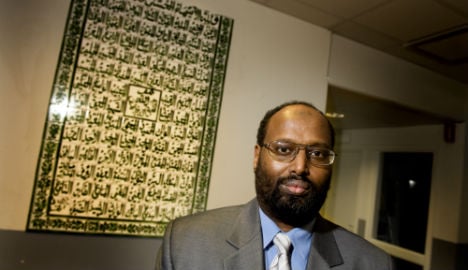SCHOOLS
Sweden to crack down on Islamic schools
Sweden plans to ban groups who do not support gender equality from starting or running schools, the country’s education minister said on Sunday.
Published: 11 March 2018 13:31 CET

Abdirisak Waberi, when he was headmaster of Lars Pehrson / SvD / TT
Gustav Fridolin made the call as he launched an inquiry into tightening the regulation of religious schools in the country.
“The regulatory framework will be tightened,” Gustav Fridolin wrote in an article in the Aftonbladet newspaper. “Those who do not support fundamental values around equality and human rights should be stopped from running free schools in Sweden.”
The proposal comes as the debate around religious free schools continues to rage in the country, most recently over the decision to let the Islamic headmaster and former Moderate party MP Abdirisak Waberi start a new Islamic school in the city of Borås.
Waberi has been criticised in the past for attempting to explain why under Islam it is permitted for a man to marry four women but not for a woman to marry four men, and for expressing a desire to live in a state governed by Shariah law.
In 2006, he told Ottar magazine that he thought men should be the heads of their families. “In my opinion, it is the man that is the strong person in the relationship. He controls the relationship, and the woman stands as a base,” he said.
In his article, Fridolin said that no one should be forced to engage in any religious practices at any school, even those founded by religious organisations.
“No child should be exposed to direct or indirect compulsion to take part in religious activities in any school in Sweden,” Fridolin wrote. “And all education should be completely free of religious infleunce.”
Sweden’s Social Democrat-Green coalition government has appointed the Swedish jurist Lars Arrhenius to investigate what sort of religious instruction typically takes place in religious schools in Sweden, and also to see how the new laws being considered could be written so as to respect the European Convention on Human Rights.
Fridolin stressed in an interview with Aftonbladet accompanying his article that the government was not interested in bringing in a total ban on religious schools in Sweden, as was once Social Democrat policy.
“From my side there’s no point in attacking Jewish schools which have existed in Sweden since the 1950s,” he said.
Sweden has over 70 religious schools, the majority of which are Christian, about 11 of which are Islamic, and a handful of which are Jewish.
Fridolin complained that the current regulations over free schools did not allow school regulators to investigate the backgrounds of people or organisations who want to start a new school.
“If a club or group wants to hire premises, we check who they are, but if they want to start a school, we say ‘just go ahead’. It’s totally absurd.”
Arrhenius's investigation is expected to be completed by the New Year.
Url copied to clipboard!


 Please whitelist us to continue reading.
Please whitelist us to continue reading.